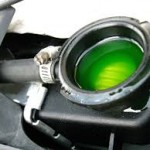Overheating Car Problems – How To Diagnose
 Austin, how are you today sir. I just love your site and all the information you give…and for free. What a blessing you are to us. I have a question which I did not find an answer to on your site. My car, 2001 Honda Accord has an engine overheating problem that my mechanic can not seem to figure out.
Austin, how are you today sir. I just love your site and all the information you give…and for free. What a blessing you are to us. I have a question which I did not find an answer to on your site. My car, 2001 Honda Accord has an engine overheating problem that my mechanic can not seem to figure out.
When I get on the freeway or take a long trip at 60MPH+ with the a/c on the temperature gauge will slowly make its way up into the red area. The mechanic did a cooling system pressure test and said there were no leaks. He recommended we change out the water pump, which we did but it did not help. Do you have any thoughts on what might be wrong?
Danny
Hey there Danny!
Thanks for your kind words. I made a video which I will put below this comment that you should watch. It should help you determine what is causing the engine to overheat. If the cooling system pressure test did not reveal a coolant leak then there was no need to replace the water pump.
The pump just “pumps” or circulates the coolant throughout the engine and radiator. Very rare for a pump to quit pumping, although I have seen 1 pump impeller rust off due to severe cooling system neglect over years. So as long as the belt is on the pump, and the pump is not leaking it should be doing its job just fine.
Usually a high speed overheating issue is related to lack of coolant circulation or lack of air flow across the radiator. Think of it like you trying to run a 100 yard dash with your mouth closed off just breathing through your nose. You will not get enough air flow into your lungs to run the race, at least not fast.
If the radiator is clogged up at the bottom (which you will not be able to see from the top) then the coolant can not properly circulate through out the engine fast enough to keep it cool.
Since this radiator is over 10 years old, I would not be shocked if it had rust and mineral deposits at the bottom restricting coolant flow. “Flushing” the radiator is great for general maintenance but does nothing for removing a blockage, especially at the bottom where you can not get to.
You can have a radiator shop (if you can find one anymore) remove the radiator and “boil out” the gunk or better yet, you can replace the radiator with a new aftermarket one from your local auto supply store.
Thanks to China, the price of a new aftermarket (Non Honda made) radiator is pretty cheap these days. I would also recommend replacing the thermostat as well at this time.
Here is the video, take a watch and see if you agree with my suggestion.
Please share this with your friends,
Austin Davis

I have a 97 Cadillac seville sls. It’s overheating if I go over 40mph. It goes up slowly and than goes back down when I slow down and back up than goes to red and I pull over. Only thing I can think of is a head gasket. Would that be correct? The fluctuation of the temperature gauge is what confuses me I thought if it was head gaskets that it heats up immediately? Please help!
I would start with a cooling system pressure test to rule out any external or internal coolant leaks, then check the radiator for a restriction (if its the original radiator I would not be surprised if its plugged up at the bottom and needs to be replaced) then check the electric radiator cooling fan to make sure it is coming on.
So I have a 2000 Honda accord se and it has been overheating for the past couple of weeks. I changed the radiator hose because there was a hold in it, than the thermostat, than the heater hose still running hot when I drive it for awhile like 20-30mins. Not to mention there is some yellowish gunk in the radiator and the reserve. I’ve flushed it out with water and it just comes back. Not to sure what to do at this point. The radiator itself is only 2yrs old
Hi there, did you watch my overheating video? https://www.youtube.com/watch?v=SPt4J-Z-qLo
I would first start by checking the coolant level inside the radiator, and if it’s low then I would get a cooling system pressure test to help you locate where the coolant leak is so you can repair it. A restriction inside the radiator (caused by rust and mineral deposits…and is probably what that yellowish gunk is you saw) will restrict the flow of coolant circulation inside the engine, and usually cause an overheating issue at freeways speeds of after driving longer distances.
I would also check to make sure the electric radiator cooling fan is coming on when the engine heats up, that fan is needed at slow speeds and at idle, but not so much when driving at higher speeds. The radiator is the main source of heat removal at higher speeds or when driving longer distances, so that yellow gunk has probably stopped up the radiator and you might need to replace it again…or visit a radiator shop and have them “boil it out” so coolant flows through it properly.
Rusty coolant is as sign that there is a coolant leak somewhere allowing air inside the system, that is causing rust.
Keep me posted as to what you find out.